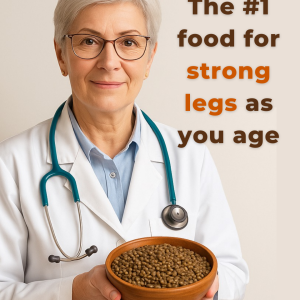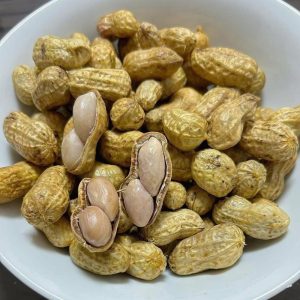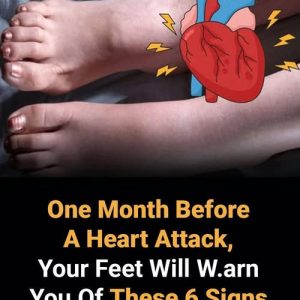
Legs do more than just get you from point A to B — they’re your foundation for independence. If stairs feel steeper or you’ve been getting annoying nighttime cramps, you’re not alone. But here’s the truth: it’s not always “just aging.” Many issues with leg strength and discomfort come down to nutritional gaps.
Your muscles, bones, nerves, and joints all rely on a steady supply of vitamins and minerals to function properly — and after age 50, your body becomes less efficient at absorbing them. The good news? With the right nutrients (and a bit of movement), you can restore leg power, reduce cramps, and feel more stable on your feet again.
1. Vitamin D: The Muscle Coordinator

Low vitamin D levels are surprisingly common in older adults — and one of the first symptoms can be weaker leg muscles.
Why It Matters:
- Supports fast-twitch muscle fibers that help you catch yourself if you trip.
- Improves the “signal connection” between your brain and your leg muscles.
- May reduce muscle aches, stiffness, or that heavy-leg feeling.
How to Get More:
- Sunshine: Expose arms and legs for 15–30 mins daily (depending on skin tone and weather).
- Diet: Fatty fish (like salmon), egg yolks, and fortified dairy.
- Supplement tip: Take vitamin D with a meal that contains healthy fat (like avocado or olive oil) for better absorption.
2. Calcium: Strengthens the Framework

Everyone knows calcium helps bones — but did you know it also helps muscles contract properly? Without enough, your legs may feel wobbly or weak.
What You Need to Know:
- Pills aren’t always best. Calcium from food is better absorbed and less likely to build up in arteries.
- Bones need mechanical stress to absorb calcium — so walking and movement matter.
Top Food Sources:
- Cooked leafy greens (spinach, kale, bok choy).
- Sesame seeds (sprinkle on salads or smoothies).
- Fortified plant milks or firm tofu (made with calcium sulfate).
3. Vitamin B12: For Steady Nerves and Balance

Vitamin B12 is like the “wiring technician” of your nervous system. When levels are low, the signals from your brain to your legs get fuzzy — which can affect balance and coordination.
Warning Signs of Low B12:
- Tingling, numbness, or “pins and needles” in your feet or legs.
- Feeling off-balance or unsure when walking.
- Leg weakness that worsens by evening.
Where to Find It:
- Animal-based foods: fish, meat, eggs, dairy.
- Fortified cereals or plant milks (check the label).
- Supplement tip: Older adults often need a B12 supplement, especially if on a vegetarian or vegan diet.
4. Magnesium: Your Leg’s Natural Relaxant

Magnesium helps muscles relax after they contract — without it, you may feel tight, crampy, or restless, especially at night.
What It Does:
- Helps muscles “let go” properly after movement.
- Regulates nerve impulses so your legs don’t spasm randomly.
- Works in balance with calcium — one tenses, the other relaxes.
Magnesium-Rich Foods:
- Pumpkin seeds and sunflower seeds.
- Almonds, cashews, and peanuts.
- Avocados and steamed greens (like chard or spinach).
Supplement Tip:
Forms like magnesium citrate or glycinate are often better tolerated and absorbed than cheaper forms like magnesium oxide.
5. Potassium: For Smooth Muscle Function

Low potassium can lead to leg cramps, fatigue, and muscle twitches — especially after sweating, illness, or diuretic use.
Signs You Might Need More:
- Cramping at night or after exercise.
- Feeling sluggish or slow to recover after walking.
- Irregular heartbeat in extreme cases.
Natural Sources:
- Bananas, sweet potatoes, white beans.
- Coconut water (great for hydration).
- Spinach and cooked beet greens.
Note: Too much potassium can be dangerous for people with kidney disease, so check with your doctor before supplementing.
6. Vitamin K2: The Calcium Traffic Cop

Vitamin K2 helps ensure calcium goes to your bones — not your arteries, muscles, or joints. It’s a lesser-known nutrient, but vital if you’re taking calcium or vitamin D.
Why It Matters:
- Directs calcium to bones and prevents arterial calcification.
- May reduce risk of joint stiffness and leg artery narrowing.
Where to Get It:
- Natto (fermented soybeans) is the top source.
- Fermented cheeses (like gouda, brie).
- Supplement tip: Look for K2 as “MK-7” — it lasts longer in the body than MK-4.
7. Omega-3s: To Fight Inflammation and Pain

If your legs ache, swell, or feel stiff, inflammation could be involved — and omega-3 fatty acids help calm it down.
Benefits for Your Legs:
- May reduce joint inflammation and leg discomfort.
- Improve blood flow to leg muscles.
- Support nerve health and may ease neuropathy symptoms.
Top Sources:
- Fatty fish (sardines, mackerel, salmon).
- Flaxseeds and chia seeds (plant-based ALA).
- Fish oil or algae-based omega-3 supplements.
Bonus Tip: Movement Multiplies the Benefits
Nutrients are essential — but they work even better when paired with movement. Weight-bearing exercises like walking, bodyweight squats, or simply standing up from a chair multiple times a day help your body actually use the nutrients you give it.
- Take a short walk after meals (boosts both blood sugar control and circulation).
- Do gentle calf raises while brushing your teeth.
- Stretch your hamstrings and hip flexors daily.




